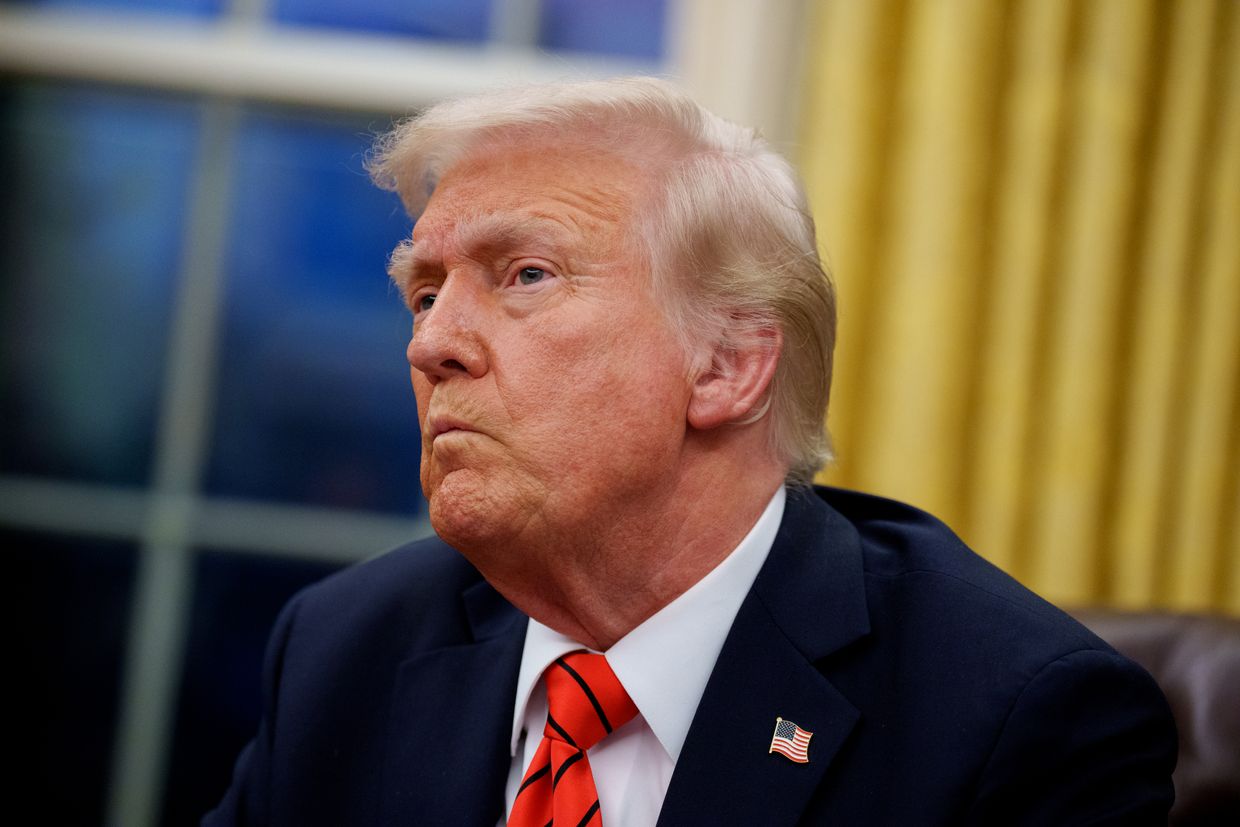Ukraine Business Roundup — Trump wants Ukraine's natural resources, and more

The following is the Feb. 18, 2025 edition of our Ukraine Business Roundup weekly newsletter. To get the biggest news in business and tech from Ukraine directly in your inbox, subscribe here.
Ukraine's natural resources — We'll take them all please
It all seemed to be going swimmingly at first. President Volodymyr Zelensky had wooed Republicans and U.S. President Donald Trump with a sweet deal on Ukraine’s “critical minerals.” Trump seemed to take the bait, telling the world he was going to make a deal with Ukraine on its “rare earths and other things” in exchange for support.
Then Trump comes out saying that actually, he would like the U.S. to be paid back for the $350 billion that it had given Ukraine for its war effort — a number that doesn’t correspond to reality. U.S. assistance to Ukraine since the start of the invasion is somewhere around $100 billion, much of which has gone to paying back the U.S. for weapons it’s sent to Ukraine.
Trump also claimed at that time that Kyiv had "essentially agreed" to a deal on a $500 billion resource deal. "I told them that I want the equivalent of like $500 billion worth of rare earth (minerals), and they’ve essentially agreed to do that," the U.S. president said in an interview with Fox News on Feb. 10.
To the public, the deal seemed to be quickly turning into Ukraine — the country that was invaded — being asked to pay reparations to an ally.
The floodgates seemed to break open when U.S. Treasury Secretary Scott Bessent showed up in Kyiv with a one-page memorandum of understanding-style document with the terms of the deal the U.S. was proposing.
While the contents of the deal weren’t revealed to the public, what we did find out pretty quickly was that Bessent asked Zelensky to sign on the spot, but the Ukrainian president refused, wanting more time to review the deal, and namely, because the document made no mention of any security guarantees in exchange for Ukraine’s resources.
Over the following days, reports surfaced with the details of the proposed deal.
Here’s what we know: The Trump administration is reportedly seeking a 50% interest in all of Ukraine’s natural resources — not just critical minerals, but valuable natural resources like oil and gas, as well potentially stakes in port and other critical infrastructure, through the creation of a joint investment fund.
The deal would give the U.S. half of Ukraine’s earnings from resource extraction and the sale of new licenses, as well as priority in purchasing Ukraine’s mineral exports, the New York Times and other outlets reported, citing Ukrainian and European officials.
The Telegraph got a hold of a copy of the memorandum, reporting that it said explicitly that the proposed deal covers the “economic value associated with resources of Ukraine,” including “mineral resources, oil and gas resources, ports, other infrastructure (as agreed).”
Current and former senior Ukrainian officials have expressed serious concern about the deal, with one calling it “colonial” in comments to AP, and saying that Zelensky should not sign it. They see it as audacious that the U.S. would seriously come and ask Ukraine to give up so much when it is the victim of this war.
One area that seems to have irked officials the most, according to sources, is the oil and gas part of the proposed deal. Underdeveloped critical mineral deposits — fine, but gaining a stake in the country’s massive oil and gas sector? Not so fast. Oil and gas giant Naftogaz is one of the country’s largest companies and taxpayers, making a profit of over $500 million in the first nine months of 2024.
Zelensky and his team have reportedly come up with a counterproposal, but it’s unclear yet where that counteroffer stands.
One thing to keep in mind, as some of my interlocutors have mentioned, is that the deal presented by Bessent is just the first offer. And to remember that this is all pretty par for the course with Trump, who likes to swing for the fences in negotiations to get the most out of them. The two sides will keep hashing it out, likely to meet somewhere in the middle, they say.
It’s not just about what the two sides want, either. Ironing out the details of a deal like this will not happen overnight. For one, Ukraine’s natural resources belong to the Ukrainian people, per the country’s constitution — no one president can just hand them over without parliament ratifying some sort of agreement.
It’s also unclear what jurisdiction will govern any future potential joint ventures. The document passed along by Bessent proposes that the deal be “governed by New York law, without regard to conflict of laws principles,” as the Telegraph revealed. People aren’t totally sure about why New York was chosen, and think that’s just another layer to this that still needs to be sorted out.
But some in the business world don’t see the possibility of a deal to create joint ventures in such dire terms.
Many of them welcome the idea of American know-how, expertise, and management entering into business with Ukrainian companies — some of which, especially the state-owned ones, have languished for years, underdeveloped and poorly-managed, or in some unfortunate cases, owned by shady oligarchs, and breeding grounds for corruption.
Stay tuned, as there’s sure to be more.

Defense tech — Changing tides
Ukrainian weapons startups are finally seeing an inflow of funds from Western investors who have long been intrigued by Ukraine's defense tech sector but have so far kept their money out of the war-torn country, defense industry reporter Kollen Post writes in his latest.
Financial analysis firm Pitchbook provided the Kyiv Independent with data showing a four-fold rise in foreign venture capital deals in Ukraine-headquartered startups after the market flatlined in 2022 and 2023 following Russia’s invasion.
The total dollar value remains slim — just under $20 million by Pitchbook’s accounting, and $40 million according to the Ukrainian government. But with most of these new deals coming in at the end of 2024, a dam may be bursting.
Western investors have until now been hesitant to hand money over to these Ukrainian firms. But pressure on Europe to expand its military muscle might be changing that.
“We are getting more and more interest all the time,” says Deborah Fairlamb, who runs a U.S.-registered but Ukraine-focused fund, Green Flag VC. “There's been tons of inquiries from governments all over the place.”
Read the full article here.
And in case you missed it — Post has also assembled a list of 10 Ukrainian drone makers, producing unmanned aerial vehicles ranging from mass-produced first-person view (FPV) drones to highly secretive deep-strike UAVs that we believe to be the biggest game in town.
Check it out here.
What else is happening
Director of popular Ukrainian online casino detained over company ties to Russia
Ukraine’s State Bureau of Investigation (SBI) has detained the director of popular online casino Pin-Up over its alleged Russian ownership and business in Russia, the agency announced in a press release on Feb. 14. An ongoing investigation into the company earlier found that its real owners were Russian citizens. The owners allegedly collected personal data and information about the location of Pin-Up’s users, including Ukrainian military personnel.
German drone manufacturer Quantum Systems plans to double production in Ukraine
Quantum Systems, a German drone manufacturer operating two plants in Ukraine, plans to double its drone production in the country, Ukraine's Strategic Industries Ministry announced on Feb. 14. The company last year promised to supply Kyiv with 500 reconnaissance drones by the end of 2024. Meanwhile, Ukraine is set to receive 6,000 AI-powered HX-2 attack drones from the Munich-based defense technology firm Helsing. The HX-2, an electrically propelled precision munition with a range of up to 100 kilometers, is equipped with onboard artificial intelligence, ensuring resilience against electronic warfare.
European Business Association calls on Ukraine to declassify mineral deposit data
The European Business Association (EBA) urged the Ukrainian government to declassify its information on mineral deposit data in a statement published on Feb. 13. The association argued that current restrictions hinder international agreements and discourage investment. Currently, information on resources such as gold, lithium, titanium, and platinum is classified as secret or "for official use," limiting Ukraine’s ability to engage with global partners.
EU-Ukraine agri-trade reaches record $17 billion in 2024
Agricultural trade between Ukraine and the EU reached $17 billion in 2024, exceeding the previous record of $16.5 billion in 2022 by 3%, the Kyiv-based research Institute of Agrarian Economics (IAE) reported. The trade volume is the highest since the EU-Ukraine Association Agreement was signed in 2014, said Mykola Puhachov, deputy director of IAE. Agricultural expert Oleg Nivievskyi told the Kyiv Independent that exports likely increased due to rising prices.
Europe at 'kids' table' in talks on Ukraine, Rheinmetall chief says
European countries have found themselves at "a separate kids' table" in the negotiations on Ukraine because of insufficient investment in their defense, Armin Papperger, chief executive of Rheinmetall, said in an interview with the Financial Times published on Feb. 18. "If you don't invest, if you're not strong, they handle you like kids," Papperger said, adding that over the past 30 years, Europe has considered it acceptable to invest about 1% of GDP in defense. "If parents have dinner, the kids have to sit at another table," he said. "The U.S. is negotiating with Russia, and no European is at the table — it has become very clear that the Europeans are the kids."












